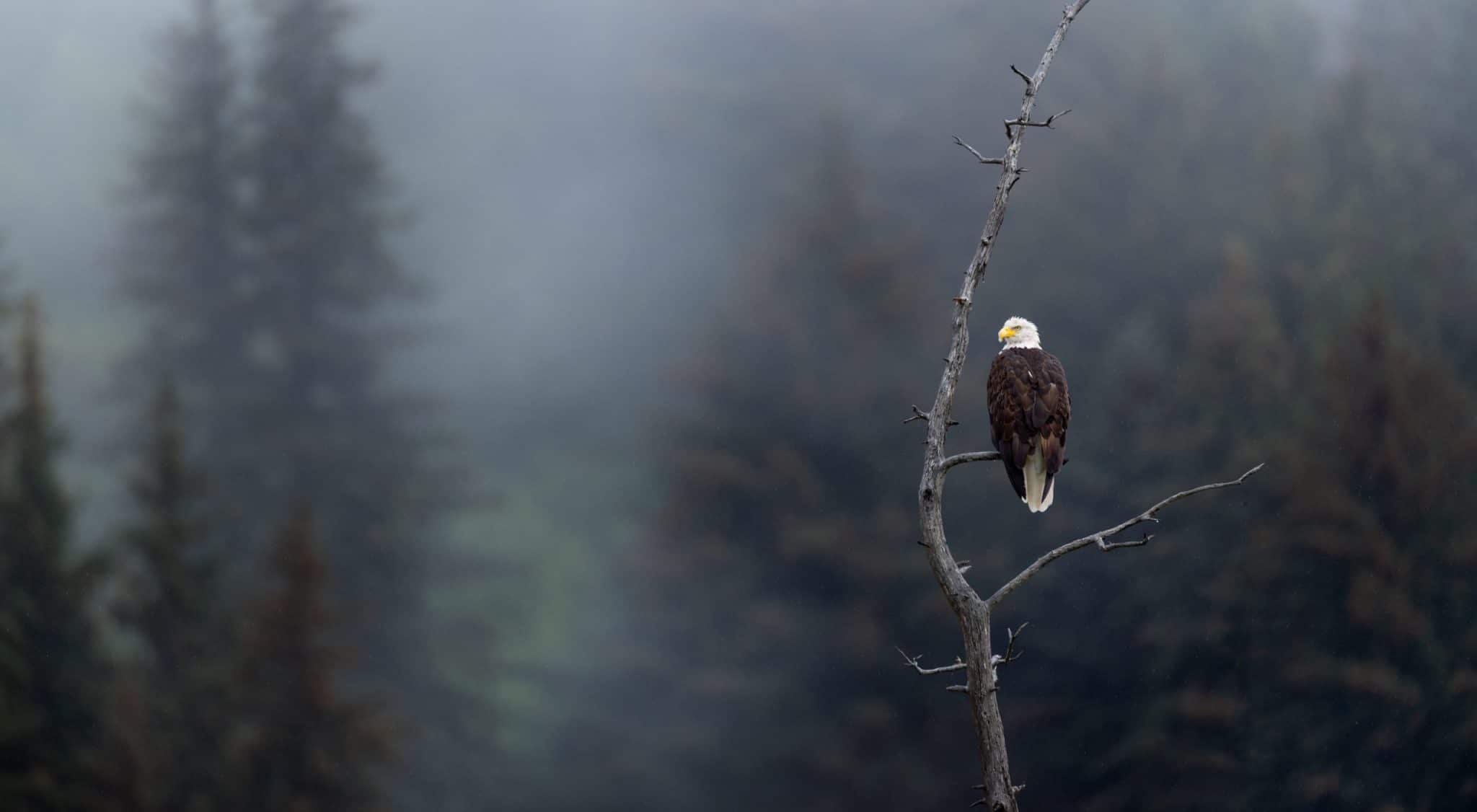On wings like eagles: Faith lessons from bird-watching
Dr Ang Chin Sim // December 22, 2021, 4:26 pm

"While most of us hate storms, the eagle loves them," writes Dr Ang Chin Sim, and explains why in this reflection. Photo by Ray Hennessy on Unsplash.
The pandemic has kindled my interest in birds. Leisurely walks around the neighbourhood tend to make one notice more of nature and the creatures therein, and I decided to take a bird-watcher’s foray through the Bible.
If you think of it, God was the first bird-watcher, because He created them all. (Genesis 1:20-21)
The word “bird” or “birds” appears 125 times in the New King James Version (NKJV), with 59 that talk about “doves” or “turtledoves” or “pigeons”. Eagles are mentioned 34 times in the KJV.
Birds can be found in Genesis as well as in Revelation – and in the books in between too. While on my bird safari through the pages of the Bible, I learned some lessons about:
1. Birds and anxiety
Remember the song “Don’t worry, be happy” by Bobby McFerrin? A cute, cheerful piece of music. Nonetheless, though it tells you to be happy, it does not give solutions to overcome worry.
Jesus on the other hand tells us not to worry and addresses the reason why: Look at the birds of the air: they neither sow nor reap nor gather into barns, and yet your heavenly Father feeds them. Are you not of more value than they? And which of you by being anxious can add a single hour to his span of life? (Matthew 6:26)
We have a Father who knows us and is aware of our needs.
Birds don’t worry like we do. While they are industrious and are often busy foraging for food, they are not burdened with the cares of this world. They live from day to day.
Humans chase after material possessions and comfort living, thinking that it will give security but the wise know that these things don’t count for eternity.
Worry doesn’t extend our life span; in fact it may even shorten it. The solution is found in the latter verses of the same passage: But seek first His kingdom and His righteousness, and all these things will be given to you as well. (Matthew 6:33)
We have a Father who knows us and is aware of our needs. When we place priority on God’s Kingdom, we are seeking what will last for eternity and the problems in this ethereal life on earth will pale in comparison to the treasures that are in heaven. Therefore, don’t worry!
2. Birds and provision
Then a wind from the Lord sprang up, and it brought quail from the sea and let them fall beside the camp … And the people rose all that day and all night and all the next day, and gathered the quail. (Numbers 11:31-32)
God provides for birds, and on the flip side, has used birds to provide for humans. When the Israelites got tired of manna and craved meat in the wilderness, they cried out and God sent them meat in the form of quails.
God may well use you as a dispatcher – perhaps to bless someone in need with your gifts.
He has used birds as dispatchers too: Then the word of the Lord came to Elijah: “Leave here … You will drink from the brook, and I have directed the ravens to supply you with food there.’ So he did what the Lord had told him … The ravens brought him bread and meat in the morning and bread and meat in the evening, and he drank from the brook. (1 Kings 17:2)
God is able to provide exceedingly, abundantly, more than we can ever ask or think, in ways that we as humans can’t even begin to imagine, because He loves us so much!
And He may well use you as a dispatcher – perhaps to bless someone in need with your gifts, just as He used ravens to minister to Elijah.
3. Birds and power
The Lord is the everlasting God, the Creator of the ends of the earth … He gives power to the faint, and to him who has no might he increases strength. Even youths shall faint and be weary, and young men shall fall exhausted. But they who wait for the Lord shall renew their strength; they shall mount up with wings like eagles. (Isaiah 40:28-31)
When we think of a bird that has power and strength, the eagle often comes to mind, and these verses are comforting. Worry and stress often drain us and sap our strength. No one is immune to stress – even the young are subject to this.
No one is immune to stress – even the young are subject to this.
What is “stress”? Stress is that gap that is between the demands that are placed upon us and our ability to meet those demands. The experience is akin to facing storms in our lives.
While most of us hate storms, the eagle loves them. It waits on its ledge and when it sees that hot air is being heated up and thermal drafts are rising, it steps off its perch and spreads its wings to soar.
The faster the winds blow, the higher the eagle rises. Imagine what a view it must have! And it has such incredible eyesight it can spot its prey on the ground from a very high distance – like a rabbit 3.2 km away!
Research has shown that although its eye is about the same size as a human’s, it can see an estimated four to eight times better. We see with 20/20 vision whereas the eagle has 20/5 vision and is able to see from 20 feet away what humans can see from 5 feet away.
If we see the storms of life as an opportunity to fly, learn to use the wind to lift us up to soar, those trials can become a blessing to us. When we have the eagle’s eye view, we can see the bigger picture, rather than focus only on the difficulties on the ground.
The caveat of being able to soar like an eagle is to wait upon the Lord.
The caveat of being able to soar like an eagle is to wait upon the Lord.
Waiting is not just to remain in place, in readiness or expectation of something. Like a restaurant waiter, if we have the perspective of serving God and putting Him first, He will renew our strength by giving us the wind of His powerful strength to soar upon.
While the world emphasises being powerful in ourselves and admiring people who have influential worldly power, the Christian paradox is that by recognising our weakness, we will find that God’s grace is sufficient and His power is made perfect in our weaknesses. (2 Corinthians 12:9)
4. Birds and parenting
There is a bird called the Griffon vulture eagle (nesher). It is known as the king of birds and is mentioned in the Torah. This species is monogamous and mates for life. Beautiful courtship flights take place around the nesting cliffs.
One description of the nesher is found in Exodus and used in the context of God bringing the Israelites out of Egypt: You have seen what I did … and how I carried you on the wings of nesharim, and brought you to Myself. (Exodus 19:4)
Neshers build their nest on a cliff-face in a rock cavity or on a protected ledge, using sticks, fine twigs and grass. Breeding usually begins early in the year, before the end of January. One egg is laid and is incubated by both parents for 52 to 60 days.
The chick is very weak when it hatches, with little down, weighing about 170 grams. It has to depend on its parents for all necessities.
God is protective of us and yet He wants us to be spiritually mature and learn how to fly.
When God took the Israelites into the desert after leading them out of Egypt, they had no choice but to depend on Him. And He did care for them, providing water and manna.
In Deuteronomy, there is also the reminder of how God cared, shielded and kept Israel as the apple of His eye, just like the nesher does its young. (Deuteronomy 32:11-12)
To teach the young to fly, the mother pushes it off the nest and watches as it spirals down. Before it hits the ground, she swoops down and bears it on her wings back up to the nest. Eventually the youngling learns how to fly after multiple times of being pushed out of the nest.
In the same way, God takes us out to a place where we are totally dependent on Him and no one else. It is only He who can provide and satisfy our deepest needs. He is protective of us and yet He wants us to be spiritually mature and learn how to fly, so He will push us out of the “nest” but is ready to bear us up on His wings.
Many lessons can be learnt from our feathered frequent fliers. It’s wonderful how God teaches us through nature. He provides for us, so we don’t need to be perturbed as we travel through life. He knows our needs as our Heavenly Father and will protect us as His children.
FOR MORE ARTICLES LIKE THIS:
We are an independent, non-profit organisation that relies on the generosity of our readers, such as yourself, to continue serving the kingdom. Every dollar donated goes directly back into our editorial coverage.
Would you consider partnering with us in our kingdom work by supporting us financially, either as a one-off donation, or a recurring pledge?
Support Salt&Light



